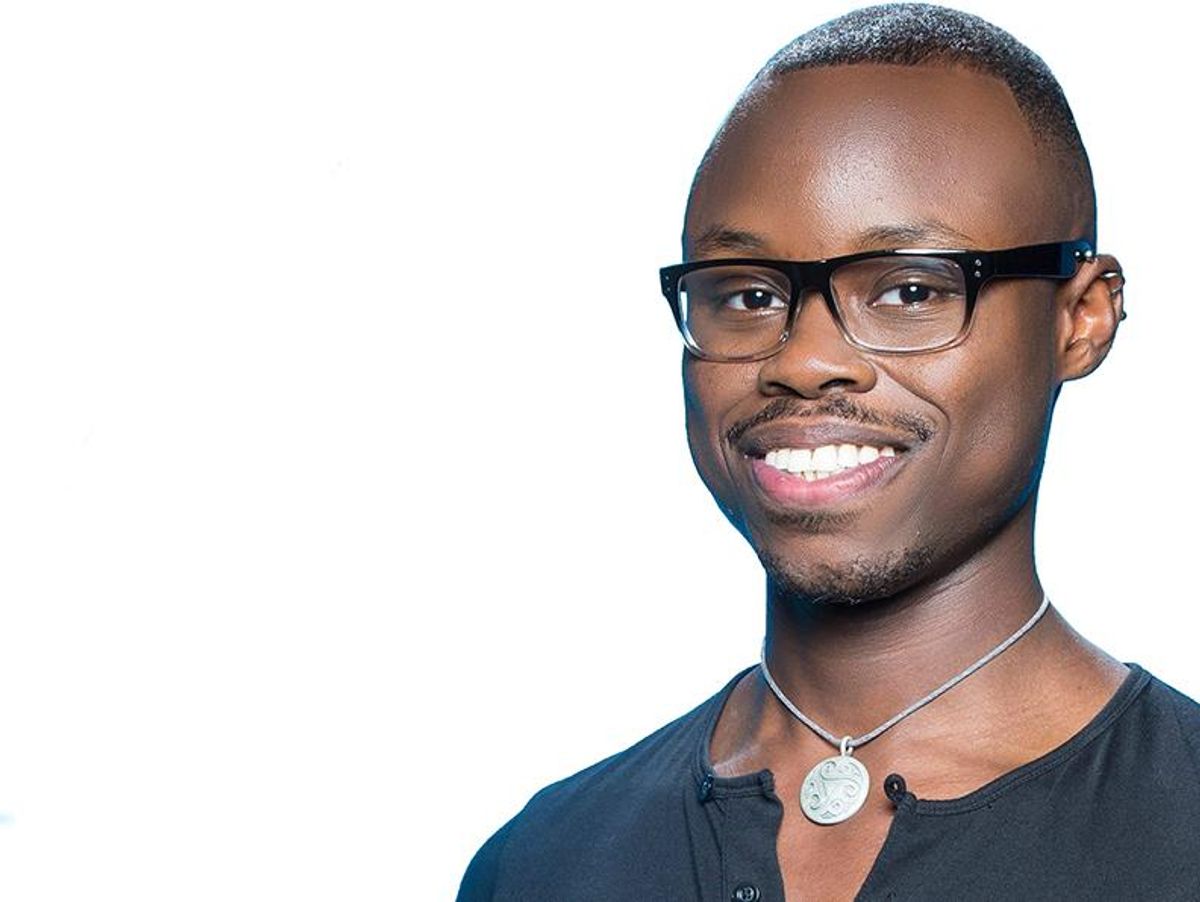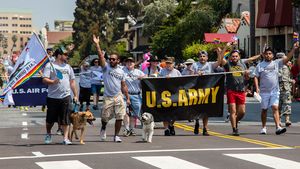Photo by Thomas Evans, HIV Equal
When Runner's World, the esteemed athletic mag for runners, chooses their next cover star, it might just be an out, HIV-positive man: 28-year old Jamil Eric Wilkins. Among the hundred semi-finalists in the magazine's Toyota-sponsored Runner's World Cover Search, Wilkins is running (no pun intended) as an out poz man. HIV-positive for a decade now, the Jersey City Heights, New Jersey, resident is a health and vitality coach by day, who dreams of competing in the 2020 Tokyo Summer Olympics. On the page where readers can vote for Wilkins to be on the cover of Runner's World, he shares the story of his breakthrough moment that includes an admission many living with HIV can understand: "This was the day the HIV infection stood deridingly and my inner critic whispered how unworthy I was of self-love because I was damaged from having a compromised immune system. I would’ve accepted a sore hamstring or stress fracture over this moment, one that I’ve never shared with anyone."
Wilkins recently spoke to Plus in an exclusive interview.
Tell me what it means to be a health and vitality coach.
So, much like Olympic runners train with the added insight, objective perspective, and enthusiastic support of an athletic coach, I partner with my empowered clients, including those living with HIV, to move them into the lives they want while living in the bodies that they love. Part of my being a health and vitality coach, as I move into physical therapy and sports medicine, involves personal fitness training and education. Becoming an endurance activist for HIV awareness may be the most rewarding part of my journey. My condition is unfortunate, but I made it work for me. I believe that being a positive public example is my calling and living as an athlete/wellness educator is my purpose. There are many ways to use fitness and nutrition in fighting HIV, and I'm fortunate to be part of that experience. I envision my clients stepping forward after our one-on-one, hands-on fitness or coaching sessions into the world to make an impact in their own unique way. They're healthy, strong, and inspired to thrive in their bodies. I'd grow with my clients and we'd all be complete — having a physical, mental, spiritual, and emotional balance. It's a beautiful thing!
You're also a Braking AIDS Ride participant too. Have you done that before?
Each year, over 200 participants make up the the riders and crew of the Braking AIDS Ride, a three-day fully supported bike ride from September 23-25. We ride our bikes from Boston to New York to support Housing Works and the fight against the dual-epidemic of HIV and homelessness. I’m new to Team Braking AIDS and I feel it’s exactly where I belong. It wasn't until the Braking AIDS Ride in September of 2015 that I became aware of the impact that my story could have on others living with HIV. Participating in rides and races to back Housing Works in fighting HIV and homelessness is an opportunity to tell my story by living it. I live my story by stepping in front of my condition and proving that I can thrive as a strong and healthy runner or cyclist. Far too often people living with HIV are faced with fears and doubts brought on by stigma. I want my journey to be an example of what it means to separate HIV from the person living with it in order to access more opportunities. My participation in these events is also a chance to learn how others are thriving; it's nice to listen to what others are saying. The exposure makes me more grateful for the strength and courage that we all share.
How long have you been running?
I've been a runner since the spring of 2004 when my classmate, right before class, suggested I join the team. I wasn't an athlete at the time, and [now] it's hard to imagine a time when I wasn't. Prior to my diagnosis a couple years after joining the team, I was embedded with a passion for running and a commitment to grow as a person through this medium.
Has being HIV-positive slowed you down at all?
Living with HIV has never physically slowed me down. In fact, living with HIV pushes me to run harder and never stop pushing forward. Running has served as my greatest ally, helping me discover who I am and overcoming the inner critic presented through stigma. I've been a runner for a very long time, and I've become aware of the emotional attachment that comes with my life-changing condition. There were times, after finally slowing down and being alone with my thoughts, when I cried and hated myself. But being a runner always gave me something to strive for, a reason to get out of bed and see the best in myself. I've moved away from self-hatred, self-doubt, regrets, and mostly self-judgment. Now, as a 400-meter hurdler in track & field, I'm adamant about living my life as the best version of myself, not just someone who's living with HIV. My dream is to compete in the 2020 Tokyo Summer Olympics as a complete version of myself.
You're a cyclist, a runner, is there anything else?
Running and cycling are large parts of my life, but I love to write, too. My most recent piece, “Stigma Undressed,” looks at the hats of stigma throughout the HIV epidemic, and considers, energetically, where we need to go from our current position. It reminds those living with HIV that they each have a voice in this world and their words give them the power to choose their approach. I'm currently working on a piece entitled "Outrunning the Stigma Behind HIV," which details my journey as a runner living with HIV and how my prowess has helped me overcome my condition and come into my truth. Other than my writing, I enjoy creating videos to educate and inspire others about health and vitality. The videos are posted on Thursdays to promote "Thriving Thursday," the day I've dedicated to remind myself and others that what we can do, we will do. Every day is all ours!
Do you think stigma against athletes with HIV is changing at all?
I'd say it is. Let's take a look at the Positive Pedalers, whose mission is to eliminate stigma through their positive public example as cyclists. I think we're reshaping the energy around stigma and using athleticism as energy block neutralizers. The energy block tells us, in one way or another, that we’re not good enough. It's never visible to the eye but sharply felt in the heart; born of ignorance and nursed on misguided thought; has darkened more hopes, stifled more ambitions, shattered more ideals, and prevented more accomplishments than history could record. But strength in numbers and visibility are ways to transform the stigma associated with athletes. As an endurance activist — a runner and cyclist fighting HIV and HIV stigma — I want my journey to be an example that nothing can stop us from living happy and healthy lives.
Why do you want to be on the cover of Runner's World?
Is being on the cover because I'm sexy not good enough?! I'm so kidding! [Laughs] Being on the cover of Runner's World is about visibility. It sets the tone for the direction we're moving in to end HIV and the stigma. I'm telling the world that we're here, we're capable of being healthy and happy, we're not merely existing as survivors. Visibility is very important; it's our voice in this fight. I always say that no one knows what I'm truly capable of, and neither do I. But I'm going to put myself out there to find out. The visibility is saying we're not giving up on being our best selves. The visibility also draws the line to the standards I'm setting for myself regarding my condition. I'm making it clear that I'm leading my life, not HIV. Basically, the HIV stigma stops with me!
What do you think it would it mean or what statement to the world would it make to have a poz guy on their cover?
To have someone living with HIV on the cover of Runner's World means that we're shifting into a more energetic space. It gives me a platform to be an example that whatever we can do, we will do. I get to be a symbol that it's okay for us to be human and live in our truth. I am not my condition and because of that, I'm not merely meant to survive and pass the time; I am empowered to thrive. I get to re-frame HIV from being the human immunodeficiency virus to health, inspiration, and vitality. I can see more publications having HIV-positive athletes on the cover, or at least featured in a few issues.


















































































